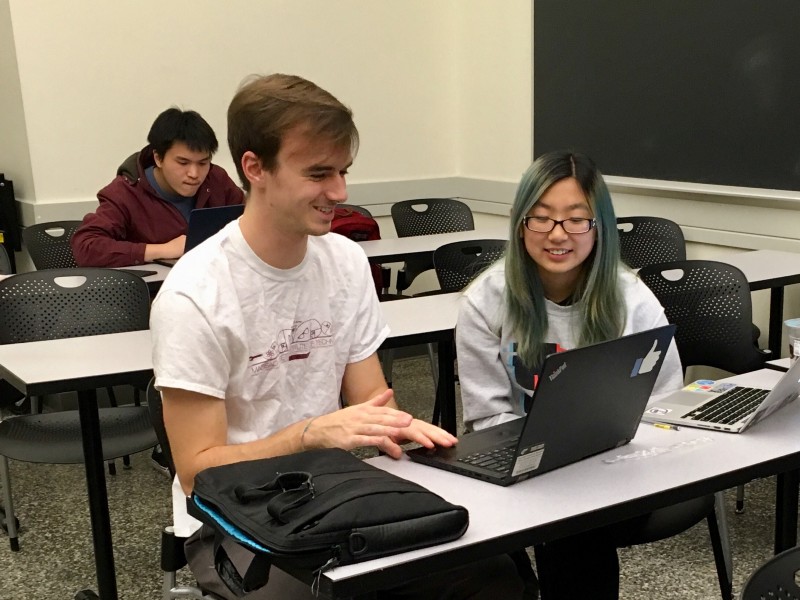HKN, the Course 6 honor society at MIT, is often thought of as the club that hosts free food study breaks, the underground guide to Course 6 classes, and the occasional resume review event. However, there’s much more than free boba and Chipotle— one of the most important services HKN offers is the opportunity to tutor and be tutored.
 HKN eligible Stef Ren ’19 reviews a student’s resume.
HKN eligible Stef Ren ’19 reviews a student’s resume.
What is HKN Tutoring?
Tutoring is the second-largest branch of HKN after the Underground Guide, with 83 student tutors in fall 2017. Tutors for HKN submit the classes and number of hours they’re willing to tutor, and they are manually matched with tutees by the HKN tutoring officers. The tutor and tutee typically meet for an hour once a week, discussing anything from pset questions to exam practice problems to topics from lecture in more depth.
The most popular classes for tutoring are large classes like 6.006, 6.046, 6.036, and 6.004. 205 students were matched with tutors this semester, which means over 20% of students in the department are involved in HKN tutoring (source). HKN member Justin Xiao ’17 discusses tutoring statistics in more detail here.
Why request a tutor?
Office hours for these large Course 6 classes tend to be very crowded, which means TAs have to focus on immediate needs like psets or exams without reviewing concepts. Unlike office hours, lectures, or group psetting, tutoring time is solely focused on you and your understanding of the subject. You’re paired with the same tutor all semester, so you can build a personal relationship with them beyond transactional Q&A. Your tutor knows you, and can encourage you and adapt to your learning style.
Tutoring can be especially helpful for classes like 6.036, which switched to a flipped classroom style for the first time this semester. HKN eligible Sooraj Boominathan ’19 notes that “[tutoring] is the first time students might be getting the subject explained to them by a real person, and not just a video.”
Why tutor for HKN?
“It was p fun” ~Anthony Liu ‘19
Aside from being paid $15/hour by the EECS department or earning HKN volunteer hours, tutoring is a great chance to sharpen your understanding of past class material, meet new people, learn about other MIT students’ study habits, and give back to the Course 6 community. HKN eligible Anthony Liu ’19 says that tutoring 6.046 helped him keep up with algorithms, which was good for interviewing. “My tutee would usually have some topics in mind and I would explain them, like a super personal recitation”, Liu says. “Before tests my tutee often wanted to do an extra hour, and we’d do more problems. I’d give test taking advice too — it was pretty fun.”
If you’ve considered TAing a class, tutoring is a great lower-commitment way to try it out without being responsible for course management (grading, writing problems, discipline/fairness, etc.). In fact, Sooraj ‘19 decided to TA 6.036 because of how much he enjoyed tutoring. “I think I’ve enjoyed teaching/explaining things for a long time now, and I like helping friends out with psets on classes I’ve taken before”, he says. Previous tutoring experience can also strengthen your TA application.
In Summary
Peer teaching is a key part of the MIT undergraduate experience! Take advantage of this opportunity and sign up to tutor or be tutored here. Tutors are in high demand, so be sure to sign up early if you request tutoring for a popular class.
If you want announcements for HKN events, add yourself to hkn-interest@ here. If you have ideas for how to improve tutoring or anything else Course 6, contact HKN at [email protected], or the tutoring officers in particular at [email protected].
Thanks to Nalini Singh and Noah Moroze for feedback. This blog post was cross-posted on Medium here.